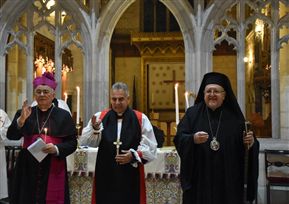A week of ecumenism brought together Christians from the different churches in Jerusalem. The Week of Prayer for Christian Unity took place from January 20 to 28, a fundamental annual event for the 13 confessions present in the Holy Land. It was, as usual, celebrated a few days after the official date, in order to allow the Armenian Christians to celebrate the Epiphany. In other parts of the world, this moment of community prayer also takes place, but in Jerusalem it always takes on a special meaning. From the very places where Christianity itself originated, where the first disciples set out to proclaim the Gospel to the world, unity was strongly desired by all Christians. Every day a different Church led the liturgy, welcoming the faithful to their headquarters in Jerusalem. From the Holy Sepulcher to the Upper Room, a single prayer rose to heaven in many different languages, like that of the apostles at Pentecost.
On January 20, the Greek Orthodox invited everyone to the Liturgy of the Hours in the Chapel of Calvary and in the days that followed each meeting was well attended by local faithful and pilgrims. On January 21, celebrations took place at the Anglican Cathedral of St. George; on January 22, they took place at the Armenian church of St. James; on January 23, the event took place at the Lutheran church of the Redeemer, and on January 24, everyone gathered at the cathedral of the Latin Patriarchate of Jerusalem. The following day, all of the participants went directly to the Upper Room on Mount Zion, and then on January 26, they visited the Syriac-Orthodox Church of St. Mark. On January 27, they went to the Ethiopian Church in East Jerusalem. The Week of Prayer for Christian Unity ended on January 28 at the Melkite Church of the Annunciation.
The liturgy included songs in the languages used by the churches, biblical passages read by the various representatives of the different confessions and a common blessing by the bishops. In his homily, the Anglican bishop of Jerusalem, Suheil Salman Ibrahim Dawani, spoke about the importance of unity and about our duty to respond to the changes that we observe in the Christian community. In the church of St. James, the faithful listened to an Armenian church representative explain how important it is to recognize ourselves as the generation to whom God continues to reveal himself for our salvation. At the Lutheran Church, the Rev. Carrie Ballenger Smith outlined how different the traditions are among the churches, and said that yet “we really must believe that unity in Christ is possible, even if we do not yet understand what it really looks like.” On the following day, the Apostolic Administrator, Mons. Pierbattista Pizzaballa, said the homily at the Latin Patriarchate, commenting on the readings of the liturgy, and making connections to the week’s theme and to reason for the meeting.
For the prayer in the Hall of the Upper Room, where Jesus gathered with his disciples for the Last Supper, many faithful came together, despite the bitter cold. “We cannot say, ‘ Lord, why are we divided?’ We know that the answer is that it is because of our sins and our attitude,” said the administrator and prior of the Dormitio Mariae, Nikodemus Schnabel O.S.B. “What we must ask ourselves is whether everyone is working concretely for unity and peace, because it is not only God’s task.”.
When the Holy Spirit breathed on the disciples and spoke in all of the world’s languages, the sound must have been similar to that of the Our Father that everyone recited in their own language at the end of prayer. Many German students from the Dormitio monastery were present at the celebration. “I’m Muslim and I’m visiting here, but I wanted to participate and see what it would be like,” said Erkan. “The theme was on Christian unity but it is something that affects all of humanity. We must pray for unity, but we must do something to make it happen. And that is what I’ll take with me when I go home.”
“It was nice to see all the different types of Christians together, said Lukas. “I felt that unity is something that the Christians who were originally here really wanted and they asked for it together, even though they did so in different languages.
The Syriac-Orthodox archbishop Mor Severios M. Murad and the Ethiopian Enbakum also invited everyone to pray and encouraged unity. The youth group that meets on Sunday mornings in the church, dressed in white and grinning from ear to ear, entertained those present with African songs and dances after after the prayer by the Ethiopians. “As Christians we must continue to work together,” said a young man named Miraf. “In the world there is a genocide of Christians and we must pray.”
At the Melkite church, on the last day, all of the representatives of the churches and the faithful were reunited. The Melkite Archbishop, Joseph Jules Zerey, asked everyone to have faith in God who does the impossible because “salvation cannot be conferred on the world except by a united Church that proclaims God’s love and mercy for every person.”
Beatrice Guarrera


